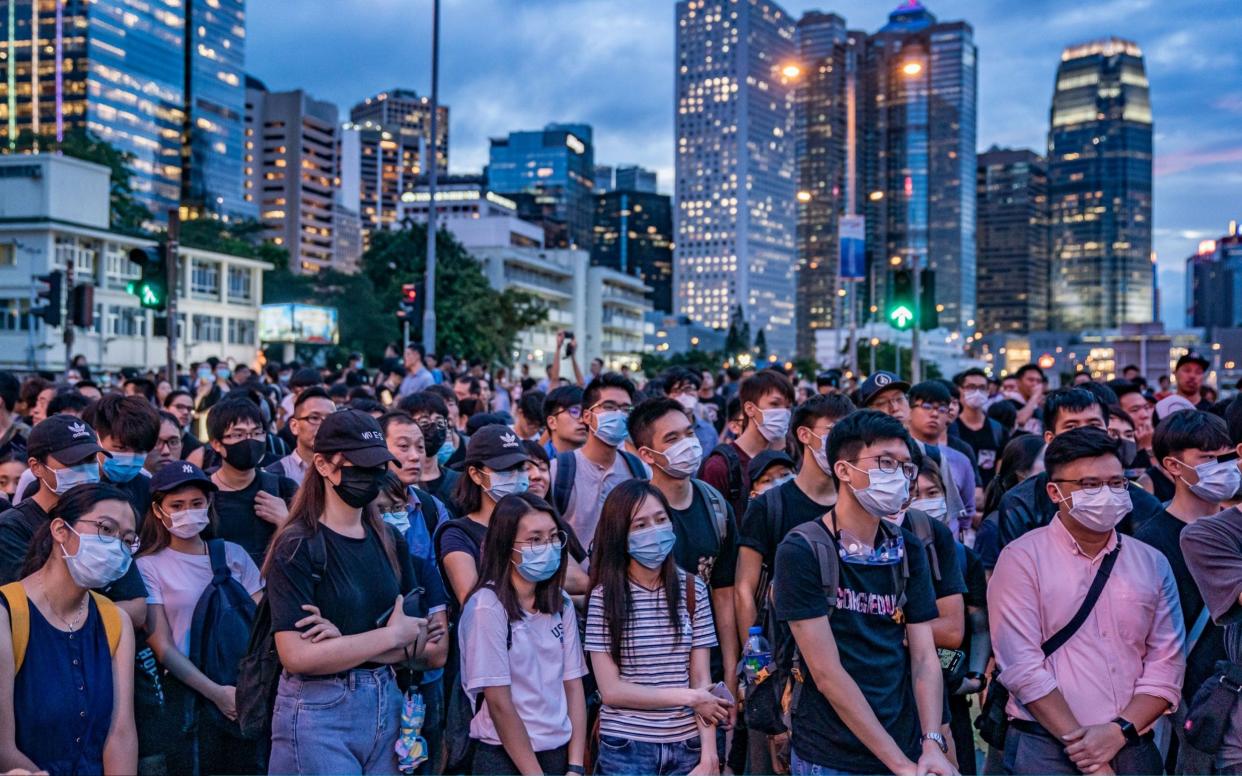Hong Kong protesters block road outside Carrie Lam's office to demand she step down

Thousands of protesters laid siege to the Hong Kong Chief Executive’s office on Monday in the latest escalation of a long-running standoff with the government over a controversial new extradition law.
The mostly young demonstrators closed down a main road near the city’s waterfront as they stood outside Carrie Lam’s office and called for her to resign and scrap the bill which would allow suspects to be sent to mainland China for trial in its opaque justice system.
Dressed in the black and sheltering from heavy rain under colourful umbrellas, the determined remnant from a march of an estimated two million people on Sunday threatened to block the road until the law was withdrawn.
The latest demonstration added to the growing pressure on Ms Lam to step down over her poor handling of Hong Kong’s biggest political crisis since its handover to China in 1997.
On Monday Lu Kang, a spokesman for China’s foreign ministry, said Beijing would continue to support the embattled leader.
However, a senior Hong Kong government official revealed that China, which would lose face over her resignation after handpicking Ms Lam for the job, would not let her leave the post even if she wanted to. “It’s not going to happen,” the official told Reuters.

With the demonstrations showing little sign of ending and activists rejecting her apologies for misjudging the public mood and her gesture to indefinitely suspend the law, Ms Lam appeared on Monday to have been backed into a political corner with no obvious way out.
The calls for her resignation were invigorated by Joshua Wong, 22, one of Hong Kong’s most renowned pro-democracy activists, after his surprise release from jail where he had been serving a two-month sentence for obstructing the clearance of a protest camp during mass rallies five years ago.
The charismatic Mr Wong, who became the face of the 2014 “Occupy” movement, revived the spirits of protesters outside the Hong Kong parliament with the rallying cry that he was ready to re-join the frontline of their campaign.
“I am proud of each and every Hong Konger that we are sending a loud and clear message to President Xi Jinping and Chief Executive Carrie Lam that we are not weak,” he said to loud cheers. “We want to send a message about the power of the people!”
Mr Wong asked supporters to allow him time to figure out his next move after his stint in jail, but many hope he will further galvanise the protests which have spontaneously snowballed into a mass civil resistance movement despite the lack of a clear figurehead or strategy.
The uproar over the extradition bill highlights public fears that Beijing is chipping away at rights and freedoms in the former British colony despite the promise of a special autonomous status when China took control 22 years ago.
Mr Wong made clear as he left prison on Monday that his political struggle ran much deeper than abolishing the extradition bill. “It is a long-term battle for us to fight for democracy under the suppression of the Communist party of China,” he told a waiting media scrum.
Bonnie Leung, a leader of the Civil Human Rights Front – one of the main groups behind the mass rallies – told The Telegraph that Mr Wong’s involvement could help elevate the flourishing campaign “to the next level,” especially among the younger generation who were inspired by his activism.
“I believe that Joshua Wong coming back and joining this campaign will only encourage people to persist and to throw out more great and creative ideas,” she said.
But Ms Leung added that international pressure was also crucial for the movement’s survival.
“Concern from all around the world is important because this is for justice, for freedom, and people need to speak up for these values,” she said.

